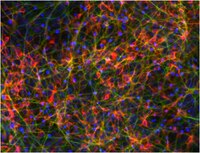GF136 Sigma-AldrichBAFF Protein, Recombinant human
The Human BAFF protein (B-cell activating factor belonging to the TNF family) is a novel ligand in the TNF family.
More>> The Human BAFF protein (B-cell activating factor belonging to the TNF family) is a novel ligand in the TNF family. Less<<Recommended Products
Overview
| Replacement Information |
|---|
Key Specifications Table
| Key Applications | Species | Source | Purity |
|---|---|---|---|
| CULT, Cult | Human | E.coli | Greater than 98% by SDS-PAGE. Endotoxin level is less than 0.1 ng per μg (1 EU/ug) of BAFF. |
| References |
|---|
| Product Information | |
|---|---|
| Presentation | Lyophilized from sterile filtered 0.5X PBS, pH 7.5, and 0.5 mM DTT, containing no additives. |
| Quality Level | MQ100 |
| Applications | |
|---|---|
| Application | The Human BAFF protein (B-cell activating factor belonging to the TNF family) is a novel ligand in the TNF family. |
| Key Applications |
|
| Physicochemical Information |
|---|
| Dimensions |
|---|
| Materials Information |
|---|
| Toxicological Information |
|---|
| Safety Information according to GHS |
|---|
| Safety Information |
|---|
| Packaging Information | |
|---|---|
| Material Size | 20 µg |
| Transport Information |
|---|
| Supplemental Information |
|---|
| Specifications |
|---|
| Global Trade Item Number | |
|---|---|
| Catalog Number | GTIN |
| GF136 | 04053252625329 |
Documentation
BAFF Protein, Recombinant human SDS
| Title |
|---|
BAFF Protein, Recombinant human Certificates of Analysis
| Title | Lot Number |
|---|---|
| BAFF, HUMAN RECOMBINANT PROTEIN | 3125609 |
| BAFF, HUMAN RECOMBINANT PROTEIN | 3019893 |
| BAFF, HUMAN RECOMBINANT PROTEIN | 2978900 |
| BAFF, HUMAN RECOMBINANT PROTEIN | 3058630 |
| BAFF, HUMAN RECOMBINANT PROTEIN - 2031374 | 2031374 |
| BAFF, HUMAN RECOMBINANT PROTEIN - 3734131 | 3734131 |
| BAFF, HUMAN RECOMBINANT PROTEIN - 4031024 | 4031024 |
| BAFF, HUMAN RECOMBINANT PROTEIN - DAM1576845 | DAM1576845 |
| BAFF, HUMAN RECOMBINANT PROTEIN - DAM1612128 | DAM1612128 |
| BAFF, HUMAN RECOMBINANT PROTEIN - JBC1889919 | JBC1889919 |
Data Sheet
| Title |
|---|
| BAFF, HUMAN RECOMBINANT PROTEIN |
Newsletters / Publications
| Title |
|---|
| Cellutions Newsletter: 2007, Volume 1 |
| Cellutions Newsletter: 2008, Volume 1 |
| Cellutions Newsletter: 2008, Volume 3 |








